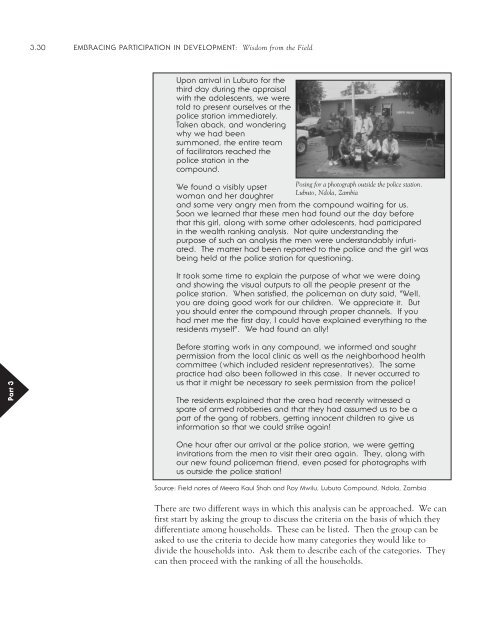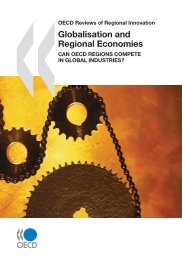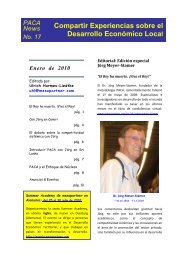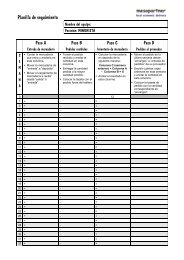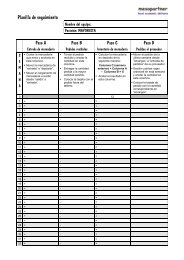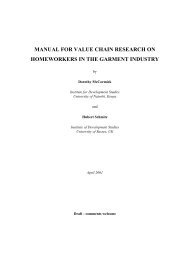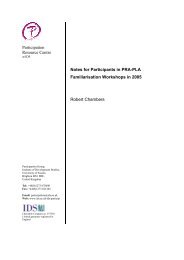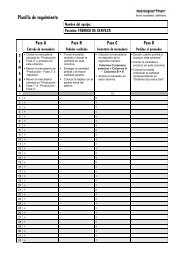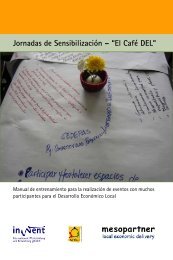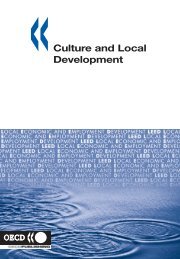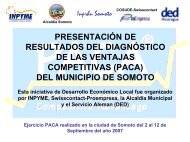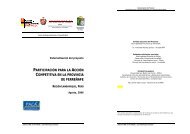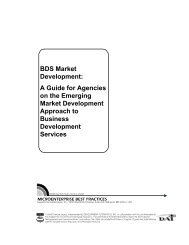PRA-Manual Embracing Participitation tools-only.pdf - PACA
PRA-Manual Embracing Participitation tools-only.pdf - PACA
PRA-Manual Embracing Participitation tools-only.pdf - PACA
You also want an ePaper? Increase the reach of your titles
YUMPU automatically turns print PDFs into web optimized ePapers that Google loves.
3.30 EMBRACING PARTICIPATION IN DEVELOPMENT: Wisdom from the Field<br />
Upon arrival in Lubuto for the<br />
third day during the appraisal<br />
with the adolescents, we were<br />
told to present ourselves at the<br />
police station immediately.<br />
Taken aback, and wondering<br />
why we had been<br />
summoned, the entire team<br />
of facilitators reached the<br />
police station in the<br />
compound.<br />
We found a visibly upset<br />
woman and her daughter<br />
Posing for a photograph outside the police station.<br />
Lubuto, Ndola, Zambia<br />
and some very angry men from the compound waiting for us.<br />
Soon we learned that these men had found out the day before<br />
that this girl, along with some other adolescents, had participated<br />
in the wealth ranking analysis. Not quite understanding the<br />
purpose of such an analysis the men were understandably infuriated.<br />
The matter had been reported to the police and the girl was<br />
being held at the police station for questioning.<br />
It took some time to explain the purpose of what we were doing<br />
and showing the visual outputs to all the people present at the<br />
police station. When satisfied, the policeman on duty said, "Well,<br />
you are doing good work for our children. We appreciate it. But<br />
you should enter the compound through proper channels. If you<br />
had met me the first day, I could have explained everything to the<br />
residents myself". We had found an ally!<br />
Part 3<br />
Before starting work in any compound, we informed and sought<br />
permission from the local clinic as well as the neighborhood health<br />
committee (which included resident representatives). The same<br />
practice had also been followed in this case. It never occurred to<br />
us that it might be necessary to seek permission from the police!<br />
The residents explained that the area had recently witnessed a<br />
spate of armed robberies and that they had assumed us to be a<br />
part of the gang of robbers, getting innocent children to give us<br />
information so that we could strike again!<br />
One hour after our arrival at the police station, we were getting<br />
invitations from the men to visit their area again. They, along with<br />
our new found policeman friend, even posed for photographs with<br />
us outside the police station!<br />
Source: Field notes of Meera Kaul Shah and Roy Mwilu, Lubuto Compound, Ndola, Zambia<br />
There are two different ways in which this analysis can be approached. We can<br />
first start by asking the group to discuss the criteria on the basis of which they<br />
differentiate among households. These can be listed. Then the group can be<br />
asked to use the criteria to decide how many categories they would like to<br />
divide the households into. Ask them to describe each of the categories. They<br />
can then proceed with the ranking of all the households.


